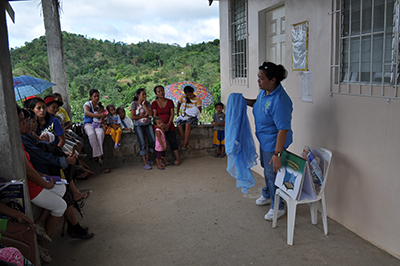
Fifteen years ago, the Philippines reported 75 000 cases of malaria every year. No surprise, any talk back then of a Philippines free of malaria would have been thought fanciful.
But now malaria has been delisted from the top ten leading causes of disease and death, and elimination of malaria is seen as a real possibility in the near future.. Indeed, the Philippines is a great example of how to successfully make progress to eliminate malaria – the subject of a new manual launched by WHO for World Malaria Day. Province by province the Philippines is being declared as malaria free and many more provinces have reached near-zero malaria cases. Overall, since 2005, malaria cases have dropped by 83% and malaria deaths by 92% in the Philippines.
This fantastic progress in the fight against malaria is thanks to concerted efforts, hard work and support from many players. Led by the national malaria control programme of the Department of Health, the Philippines has ensured a high coverage of effective malaria control interventions such as long-lasting insecticidal mosquito nets and indoor spraying with insecticides across all endemic areas. This has been implemented by Regional and Provincial Health Offices down to municipality and barangay levels. Likewise, access to prompt quality-assured diagnostics and effective artemisinin-based combination therapies (ACTs) have been provided at all levels of government, and rapid reporting and effective surveillance of malaria has been ensured. Most importantly: local communities have the knowledge and tools to tackle malaria themselves.
All these successful achievements build on the substantial and dedicated financial investments in tackling malaria, partly from the national Government of the Philippines, regional offices and local government units; and partly from significant external funding provided largely by the Global Fund to Fight AIDS, TB and Malaria (or “Global Fund”) and the Government of Australia.
Over many years WHO Philippines has played a key role in supporting the Department of Health in its campaign to tackle malaria. The financial support of the Government of Australia to WHO has enabled technical assistance and operational support to be provided on a daily basis; multiple capacity building and training activities to be implemented; innovative solutions for tackling malaria to be piloted; and the performance of the national programme to be critically assessed and supported where required.
WHO Philippines’ malaria activities have helped build a sustainable, community-centred model of malaria control. They have provided a continuum of technical innovation across the country by the national malaria programme and local government counterparts.
Looking to the future, WHO Philippines will continue to support and work with the national malaria programme and all its partners. WHO is actively assisting the Department of Health in securing a new round of funding from the Global Fund. This is very much in line with the World Malaria Day 2014 theme: “Invest in the future. Defeat malaria”.
